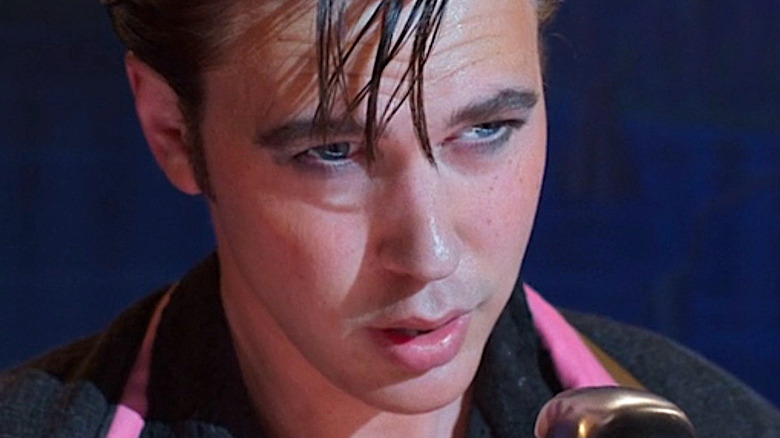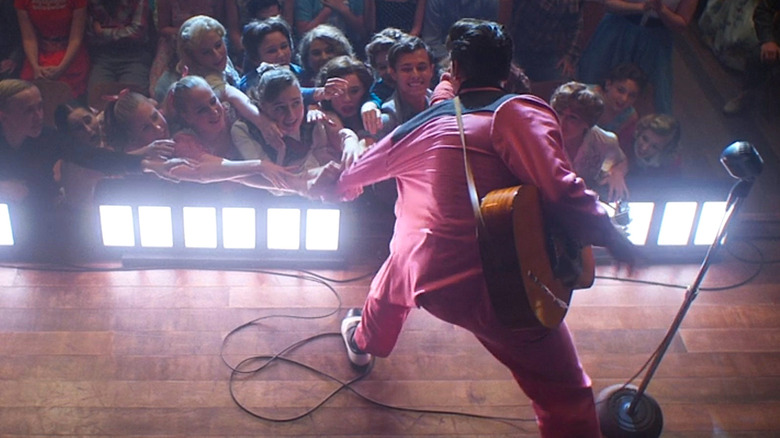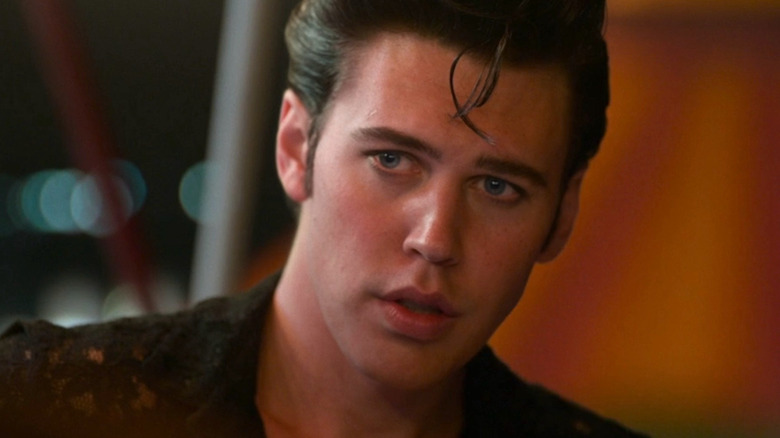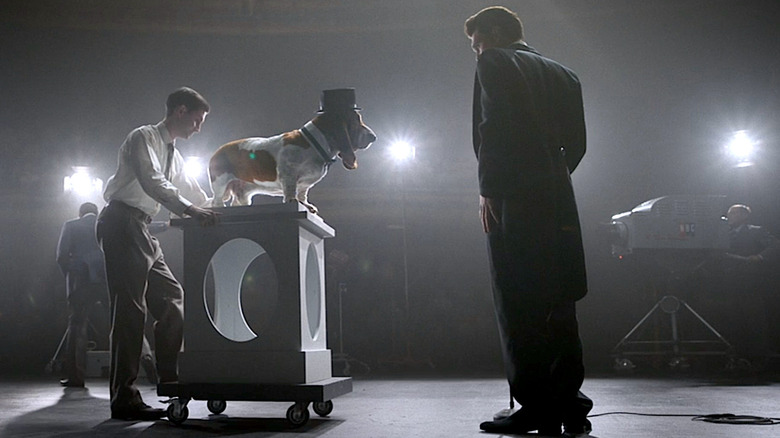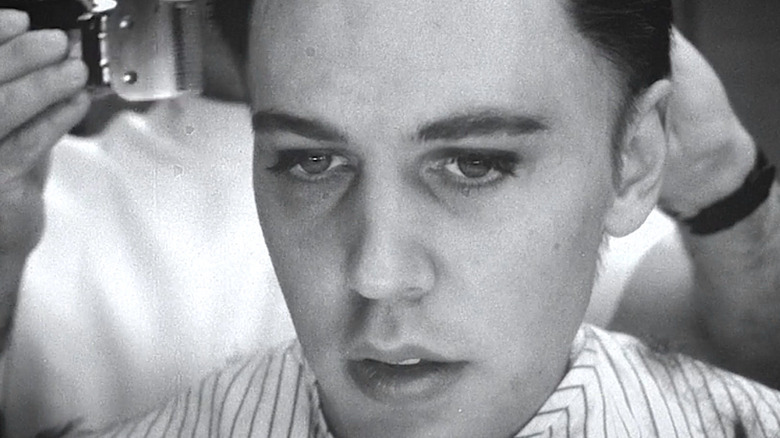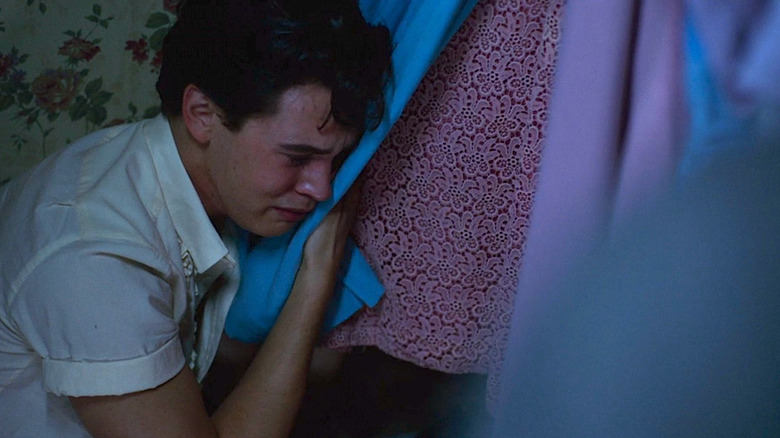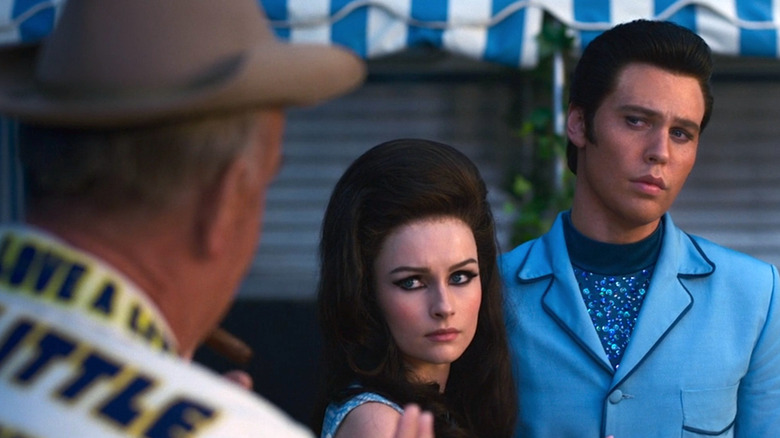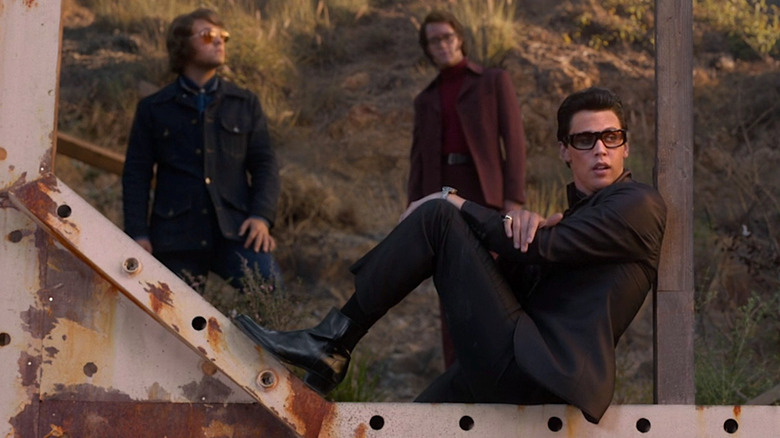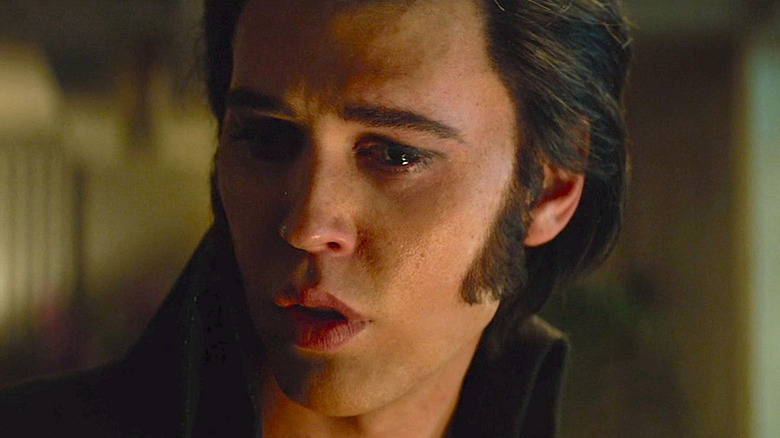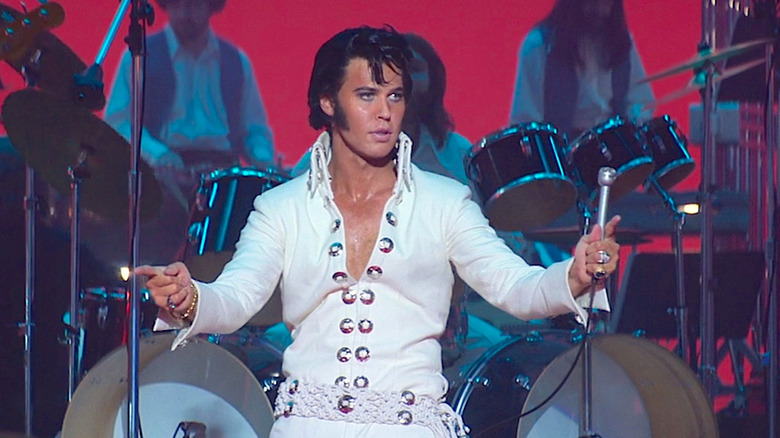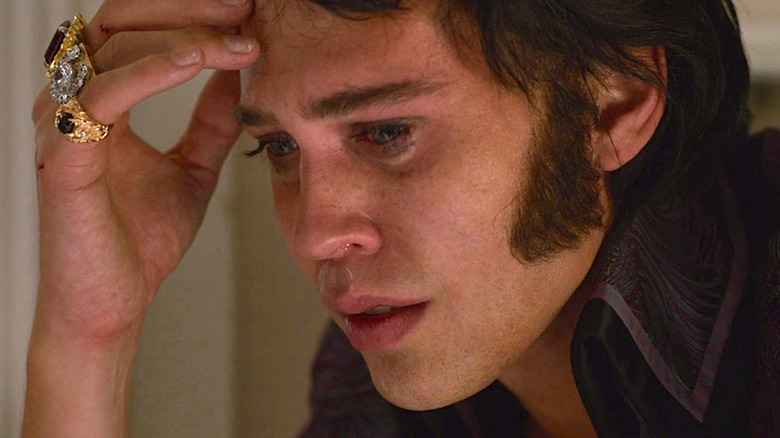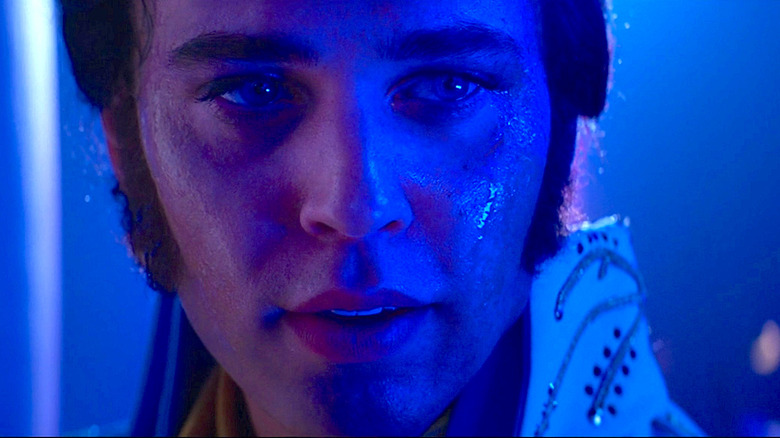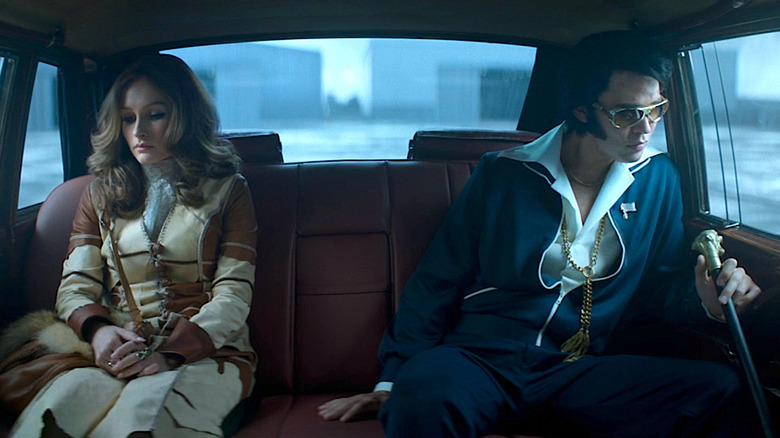The Most Heart-Wrenching Moments In Baz Luhrmann's Elvis
Baz Luhrmann's "Elvis" is a technicolor tragedy. The movie is less about the factually "true" story of Elvis and more about how pure talent can be corrupted and controlled by insecurity and greed. Rather than focus on straight facts or lingering too long on Elvis' own demons, Luhrmann uses the general framework of Elvis' life to tell a kaleidoscopic cautionary tale about the battle to be yourself and do your best work — when no one, maybe not even you — has your best interests at heart.
Austin Butler's Elvis is framed as the film's sweet, simple hero. He has a song in his heart and a wiggle in his hips, and he wants to share both with the world. Too bad he's ruled by one greedy gus: his manager, Colonel Tom Parker (Tom Hanks). As Luhrmann described to Deadline, "The Colonel represents the great sell in America, and this therefore made it about America: the sale of the soul, the artist, and the ringmaster." As the film's villain and narrator, we see Elvis through the Colonel's eyes. To him, Elvis is equal parts lost boy, heavenly talent, and elusive prey.
Because Luhrmann uses "The Snowman" to tell Elvis's story, the audience feels painfully complicit in his caging of the songbird. We root for Elvis to escape but know this hunk of burning love's song gets cut seriously short. Still, Butler's extraordinary performance and Luhrmann's trademark maximalism combine to create a feverish sense of dread and hope underneath the inevitable. We've cut a record of those scenes here. Read on for the most heart-wrenching moments in Baz Luhrmann's "Elvis."
Girls want to eat him alive
"Elvis" is a movie that plays with memory and time. Scenes are jam-packed with flickers of the future and remnants of the past. While it can be disorienting at first, it makes the heavy foreshadowing of doom in the film even more heartbreaking — even more so because every promising moment of the young Elvis' career is so full of hope. While it opens with the death of the Colonel, it begins with him telling the story of how he met Elvis.
For the first 15 minutes of the movie, we hunt Elvis along with the con-man Colonel. "The Snowman" is a music producer at this stage, and knows a good thing when he sees it. Elvis' gyrations — and the vocal effect they have on girls at one of his earliest concerts — definitely count as a good thing, and fill the Colonel's eyes with dollar signs. But while the Colonel takes notice of Elvis for his sex appeal, sound, and moves, he is bewildered by what animates the young man.
The Colonel is driven by money and keeping his own secrets. Elvis, however, seems in touch with some higher power. When he is singing and moving, he can do anything — even send his audiences to ecstasy. He's pure magic, and everyone around him wants to take advantage of it. The scene foreshadows Elvis' addiction to the audience's attention and girls, but also how powerful he can be when he is "with the spirit." While the Colonel fears the girls will eat Elvis alive, his hungry eyes let the audience know: He will, too.
Deal with the devil
The Colonel and Elvis have their first face-to-face interaction about thirty minutes into "Elvis" — surrounded by funhouse mirrors. "Lost, my boy?" the Colonel calls, before surrounding Elvis with countless versions of the man who would help him — and haunt him — the rest of his life. Elvis is young, fresh off one of his earliest stage shows, and intrigued by the Colonel's promises of bigger and better things.
Elvis weaves through the carnival crowd after the Colonel and his clown-topped cane. Together, they ride the ferris wheel. Elvis' fresh face and lined eyes go wide when the Colonel pitches him his wildest dream: the two of them working together to make Elvis' career fly. Elvis simply has to leave his old team behind, and sign over a whole lot of control to "The Snowman."
The ferris wheel scene gives us a glimpse of Elvis' desire for fame and the family he wants to provide for. But most of all, it shows us Elvis' desire to see the world. The boy wants to see it all. Just like in his favorite Captain Marvel, Jr. comic book, he wants to truly fly — all the way to the Rock of Eternity. He is so hopeful and so vulnerable at the top of that ferris wheel — and in the clutches of the Colonel. He offers up all of his hopes, dreams, and weaknesses to his would-be manager slash devil in disguise. Elvis gives the Colonel the material he will use to manipulate him for the rest of his short, profitable life, and he does it all with a smile.
The new Elvis
The dollar signs in the Colonel's eyes begin to dim when Elvis gets heat for being too hot. Of course, "Elvis the Pelvis" caught static when he performed on "The Milton Berle Show," but it wasn't just his pelvic gyrations (a cursed term Elvis disagreed with, according to TV Guide) that were drawing ire from uptight adults and seriously sex-negative politicians.
Elvis' music draws direct inspiration from Black artists, and introducing the Beale Street sound to white audiences was not received well by racist politicians, show promoters, and venues. Neither was all the motion in his ocean. Elvis is carted off a stage for his dancing — echoing a moment in real life where a Jacksonville judge warned Elvis his dancing was "impairing the morality of minors." In order to protect Elvis from legal action (and his wallet from emptying out), the Colonel hatches a plan for a new "family style" Elvis.
Elvis is disheartened because his own mother sees his dancing as good and "god-given." Elvis is miserable in his new, straitjacketed style, especially when he is reduced to singing "Hound Dog" with an actual dog, dressed in a top hat and tails like "some kind of butler." Elvis' mother begs Elvis to stay true to himself, while the Colonel gently pressures him to conform so that he still has a career to provide for his family. It's a miserable moment, and the first of many similar battles Elvis will fight — and lose — for his immortal, wiggling soul.
Elvis gets drafted
Sometime after Elvis is threatened with jail time for shaking what his Mama gave him and the Colonel starts booking actual hound dogs as his backing band, Elvis starts rebelling. In a deliciously tense stand-off on stage, after being warned by a judge not to wiggle so much as a finger, Elvis makes a point to wiggle exactly that. So the Colonel hatches a plan to get Elvis in line and his image clean-cut: send him off to war.
The Colonel convinces Elvis it will be best for his image to serve in the Army without special treatment. He further puts the screws on Elvis when he tells him becoming a draft dodger would endanger his family, especially his father, who has a criminal past. The Colonel shames Elvis' "family of delinquents." Austin Butler plays Elvis' heartache and shame so viscerally, but he agrees. The Colonel makes yet another false promise that he'll make Elvis the serious actor he dreams of becoming. Elvis is drafted, and Elvis' hair — an emblem of his soul — is cut off. Of course, the haircut is televised.
Elvis loses his mother
While the Colonel thinks his Elvis problems are solved by shipping him off to join the army, Elvis' mother's problems are just beginning. She worries herself sick over her son's tour, and her anguish and anxiety make her drink herself to death.
Elvis is destroyed by the news. Any swagger or grown image he may have developed in the service evaporates when he learns of her loss. He weeps into her dresses hanging in the closet of the home he bought for her and gasps that he never wants to leave.
Adding to the heartbreak is Elvis' overwhelmed father insisting the Colonel go talk to the grieving Elvis. The Colonel insists it isn't his place, but Vernon begs him. The Colonel tells Elvis he must keep singing, telling him, "don't let all your mother sacrificed for you be for nothing." Elvis, utterly lost, weeps and embraces the man. The line between manager and father figure blurs, and the toxic tie between Elvis and the Colonel tightens.
Elvis gets sucked back in — the first time
Elvis returns from the Army with Priscilla on his arm and the movies on his mind. But instead of the serious roles he dreamed of (and the Colonel promised him), Elvis stars in a string of more lucrative musical films. Plus, the Colonel is selling merchandise of him in every item imaginable. In a brilliant, movie-musical sequence set to "Viva Las Vegas," we see the scope of Elvis' movie career, life with his wife, and meet Elvis' "Memphis Mafia" entourage — until a shot rings out.
Martin Luther King, Jr. has been assassinated, and Elvis is shaken to his core. The joy and color of his movie career suddenly turn garish, foolish, and hollow. His films flop, as demonstrated when a silly surf scene shifts into a deluge. Elvis is drowning in the diversion his life has taken.
When the Colonel pitches a cheesy Christmas special sponsored by Singer sewing machines, one of Elvis' crew mocks the singer's new career as an "appliance salesman." Though Elvis is hurt by the insult, the sting is stronger because he knows it's true. He tries to resist the Christmas special, but when the Colonel points out how much it will pay for his family, lifestyle, and entourage, Elvis ignores his heartbreak over the reverend and his longing for some kind of meaning in order to sell carols and sell sewing machines.
Elvis longs for more
1968 Elvis knows he's stuck doing a corny Christmas special for his new sponsor, and that his career as a serious actor is over before it began. The world is changing, and he tries to make a last gasp at relevance. Elvis seeks out the promoter/producer team of Hulett ("The Dressmaker" star Mark Leonard Winter) and Binder ("Stranger Things" standout Dacre Montgomery) to help him do something special with his Christmas special.
The men aren't so sure they can help Elvis, and he understands. They meet (bizarrely) at the dilapidated Hollywood sign. From his perch in the rotten wood, Elvis remembers when it was once beautiful. He looks out over the Griffith Observatory from "Rebel Without a Cause" and laments the James Dean-style career he once longed for — one we know he doesn't have due to the Colonel's interference.
It's a wistful moment, full of yearning and edge with hope. It tugs at the heartstrings by showing Elvis betting on himself when the chips are down. He needs this. The new team agrees to work with him. Elvis smiles, and we get a flicker of the spirit being with him again — before the Colonel snuffs it out.
Triumph turns into a trap
Don't call it a comeback! Elvis' '68 comeback concert was never supposed to be one. Instead, he was supposed to follow the Colonel's orders, sing Christmas carols, and wear Christmas sweaters. But with the help of the new, hip producing team Hulett and Binder, Elvis pulls off a hit concert with songs that have nothing to do with Santa Claus coming to town. One is even a powerful song, "If I Can Dream," written by a songwriter in one night to align with Elvis' beliefs and to honor Martin Luther King, Jr.
Joy is back in the building. Elvis plans his long-dreamt-of world tour. He even attempts to respectfully part ways with the Colonel. But when the Colonel has a heart attack, he guilts Elvis into staying with him. By playing the guilt, practicality, and profit cards, the Colonel talks Elvis into doing a six-week residence at Las Vegas' International Hotel before his international tour. Elvis laughs — the snowman has struck again — and agrees.
Elvis flies high during the limited engagement. He arranges songs, plays gospel, and spreads his wings. While Elvis sings for his life about being caught in a trap, thinking he's about to be set free to fly off and see the world, the heavily indebted Colonel strikes his own deal with the hotel to book Elvis for the next five years in exchange for a new line of credit and wiping his own ledger clean. The deal is struck without Elvis' knowledge or permission, and another good thing dies because of the toxic "partnership" with the Colonel.
Elvis uses drugs to push through exhaustion
Elvis pours his heart into his performances in Vegas, even if each one steals a little bit of his soul. While his performances are not as electric or euphoric in this seemingly endless sequence as when he is connected to himself and free to do as he pleases, they are still awe-inspiring. Austin Butler channels the King, sweating, swinging, leaping, and finger-gunning his way through countless costume changes. It's even exhausting to watch — night after endless night spent being at the top of your game in, as he calls it, "a golden cage."
But all of the sweating, wiggling, singing, and entrapment starts taking its toll on Elvis' body. He collapses, and the Colonel's moneymaking life flashes before his eyes. While the Colonel sees Elvis' pill habit as something he dips into to extend his addiction to his fans' love, he is also not too concerned about feeding Elvis drugs to get him into performance shape, quickly. Elvis' trap keeps closing in on him, and the dread mounts as he starts to lose the last bits of agency available to him under his longtime manager. A star dies as a life-ending addiction is born.
If you or anyone you know needs help with addiction issues, help is available. Visit the Substance Abuse and Mental Health Services Administration website or contact SAMHSA's National Helpline at 1-800-662-HELP (4357).
Priscilla leaves Elvis
After his entrapment in Vegas, the Elvis of "Elvis" leans harder on pills and women that aren't his wife. Though he and Priscilla have a child together, Lisa Marie, he is often absentee from her life — and apparently, Priscilla's.
Priscilla leaves Elvis, in a moment where she is clearly wracked with love, longing, and the frustration borne of up-close experience with addiction. She even tells Elvis she doesn't care about his affairs, only the pills that "has-beens" and bad friends feed him. Priscilla doesn't leave in a cloud of righteousness, however. It is a messy tangle of heartbreak, and throughout the scene, you can tell if she stays one moment longer, she'll stay forever.
Instead, she tells Elvis she wants a husband. Their daughter wants a father. She embraces the weeping man as reality slowly, powerfully hits him. When she finally pulls herself away to leave, it is not a big, powerful man she leaves behind, but a lost little boy.
If you or anyone you know needs help with addiction issues, help is available. Visit the Substance Abuse and Mental Health Services Administration website or contact SAMHSA's National Helpline at 1-800-662-HELP (4357).
Elvis fires the Colonel
Years into his Las Vegas residency, Elvis finally discovers the truth about the Colonel — he's in the country illegally and fears being deported. Austin Butler's performance shifts into a different gear here as Elvis, clearly strung out and drunk, screams about how he's been trapped in Vegas instead of traveling the world because of the Colonel's lies. It's a real-time dissolution of their father figure and business partnership. He delivers the screed directly into the mic — almost swallowing it in his rage — and fires the Colonel for good this time. Almost.
The Colonel agrees to break his contract with Elvis and allow him to travel off into the international sunset with his new team, as long as he and his father pay him the money they "owe." The total is absolutely staggering and would bankrupt Presley Enterprises and take Graceland from the family. Elvis is heartbroken and disgusted that his "business manager" mismanaged their affairs so poorly. Elvis rages at the Colonel, saying he's a vampire who "bled me dry and you still want more!"
The Colonel uses Elvis' youthful confidences against him, insisting they are more alike than Elvis knows, and that "the Rock of Eternity is forever just beyond our reach." Really, the words you want to hear when you're signing away any hope of your future happiness. Vernon's heart breaks as he watches his son agree to go back to the Colonel. In a miserable, dark hotel room, he asks his father to "tell the Colonel to send up Doctor Nick." Dark fates are sealed, and the King is very close to the end.
If you or anyone you know needs help with addiction issues, help is available. Visit the Substance Abuse and Mental Health Services Administration website or contact SAMHSA's National Helpline at 1-800-662-HELP (4357).
One last flight
The end of Elvis' performance and public life is covered in a cruel, brief series of radio reports. Elvis is mocked for his weight gain and for continuing to play the same circuit. Elvis tells a visiting Priscilla that he's all out of dreams. She sees him on the tarmac before a flight, begging him to go to a clinic to help him heal from his addictions. She begs him to rest. He gently refuses, too focused instead on his upcoming 40th birthday.
It's heart-wrenching enough to consider how little life we get to live compared to the dreams we have, but watching a music legend feel just as unaccomplished as the rest of us makes this moment all the more poignant. No one gets enough time. Elvis laments never making a dramatic film. "I never made anything lasting, no one is gonna remember me" Elvis worries — and, at that moment, Austin Butler brings us so inside the man's soul that we believe him.
Elvis boards his flight and delivers a poetic line inspired by a real-life quote director Sidney Lumet gave to biographer Elaine Dundy about wanting to cast Elvis in a film adaptation of a Tennessee Williams play instead of Marlon Brando, about a legless bird mentioned in the play that reminded Lumet: "Of what I felt when I watched Presley at work: something otherworldly, inhuman (not unhuman), a kind of restless spirit that could never rest anywhere." Elvis dies at 42 and is mourned by the country. The Colonel is charged with financial abuse and dies in debt. It begs the heartbreaking question — how could all that "snow" be worth it?
If you or anyone you know needs help with addiction issues, help is available. Visit the Substance Abuse and Mental Health Services Administration website or contact SAMHSA's National Helpline at 1-800-662-HELP (4357).
